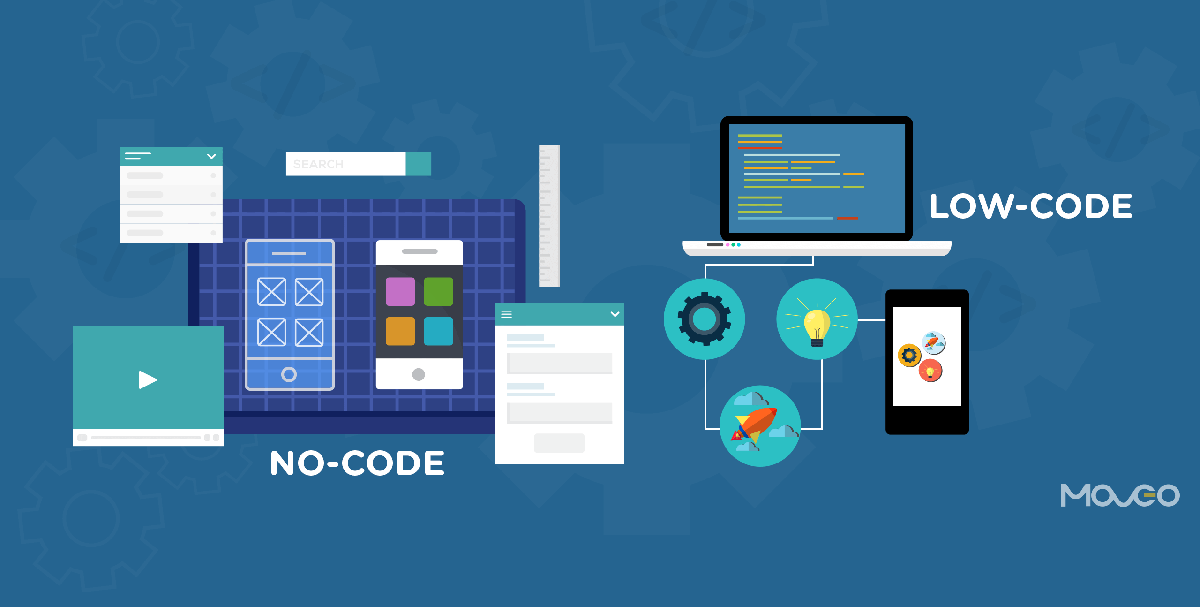App development is expensive. It takes a good deal of time and money, and enterprises are constantly on the lookout for solutions that will help them roll out market-ready apps in less time and money. To that end, there are now tools that can help anyone with little to no technical expertise create fully functional apps that are no less than their expensive counterparts.
This disruptive technology, called by many names such as low-code, no-code or rapid application development (RAD) is essentially a set of tools that make app development as easy as drag-and-drop. These tools offer functionalities such as model-driven development, point-and-click programming, wizard-based workflows and a host of similar techniques, enabling anyone to become a ‘citizen developer’. In fact, Jason Bloomberg of Forbes says that these low-code app platforms are more disruptive than you realize.
So are these low-code/no-code platforms really as revolutionary as they promise to be? Can they really make app development a whole lot faster? Do they have any disadvantages? And how do you know that they are the right mobile solution for your business? These questions are constantly popping up in your head, aren’t they? I know.
Well, don’t you worry, I’ll answer them all for you right now, and by the end of this blog post, you’ll know just what to do for your business’ mobility solutions. So dive right in.
How True Is The Promise Of Low-Code/No-Code?
First things first, if you are expecting an app to materialize at the click of a few buttons, well, no. that’s not what low-code app development platforms do. Yes, they make it easier to develop apps without any manual coding, you still need to put in a fair bit of work into developing a really rich app.
Having said that though, these platforms do make app development a whole lot easier for you. Let’s take a look at some of the biggest advantages they offer:
1. Faster Time-To-Market
One of the biggest advantages that low-code platforms offer is that they let you roll out your app much faster than any other form of app development. In this day and age, time-to-market is everything. Getting your app out there as early as possible lets you be the pioneer, take the lead and snatch an edge over the competition. Traditionally, mobile app development takes anywhere between 3 and 6 months. But with these rapid platforms, you can shorten that timeframe to a matter of weeks, even days. In fact, Gartner estimates that by 2018 more than half of all B2E mobile apps won’t be built by IT or by traditional developers.
This is primarily thanks to two main features – visual tooling and integrated app platform. Instead of manually writing code, rapid platforms let you compose the app logic visually. A rich ecosystem of UI libraries, logic and integration let you compile apps faster.
2. Increased Iteration Speed
Everyone knows that faster and more iterations translate to a better app experience. Low-code platforms let you iterate much faster than the traditional waterfall method. They help you get your minimum viable product or MVP out in hours and ready for feedback. All changes, improvements and fixes from this point forward can be done in real time instead of waiting weeks for the prototypes to be ready for user testing. Adapting becomes faster and your process becomes very agile, expediting iterations and fundamentally changing the way enterprises see apps.
3. Increased Stakeholder Engagement and Satisfaction
Owing once again to the sheer speediness of these platforms, low-code apps let you check in with the stakeholders in quick bursts and adopt any changes they suggest, no matter how often they change their minds. This leads to a highly engaging process and leaves the stakeholders extremely satisfied with their needs being met.
4. Eliminate Boundaries of Platforms and Languages
Even among trained developers, boundaries of languages and platforms can be divisive and be limiting. A developer adept in Android development can have a hard time trying to develop an iOS app. most never even try. With rapid low-code platforms though, such skills gaps can be easily bridged, leaving developers free with their imagination.
5. Easy To Maintain and Upgrade
One of the great things about low-code or no-code applications is that they are much easier to maintain and upgrade. Since they are mostly hosted by companies that provide these platforms, the companies themselves handle the server monitoring and maintenance for you, significantly cutting down the maintenance overhead. Since you don’t have any manual codebase to maintain, issuing updates, changing features and upgrading the application is easier and faster.
Things to Consider for Low-Code App Development
So as you can see, the advantages are many. Low code mobile app development platforms are definitely capable of making radical and disruptive changes in the world of mobile apps. But if you’re a skeptic realist, you’re probably thinking – this is all too good to be true. There would have to be some disadvantages. Well, not really disadvantages, but there are some points you need to be careful about.
1. They’re Not the Best Solution for Every Project
Just like all quick and easy things in life, low-code platforms aren’t suitable for just about everyone out there. There will still be some projects that will demand the investment of time and money that comes with native app development. Applications that need an extremely high level of customization or interactivity or have very sophisticated hosting requirements will have to do a lot of research before choosing low-code development.
2. There Is a Learning Curve
If time is the main reason you are just jumping into low-code platforms, you must consider that there will be a learning curve that may cost you some additional time. However, they are still fairly easy to learn and adapt to, so do your research first.
3. You’ll need To Thoroughly Research Your Platform
There are a number of front-runner low-code app development platforms available out there and new ones are emerging every day. With a number of choices comes the inevitable confusion. Determining which platform is best suited to your needs can involve a great deal of thinking, enquiring and comparing.
4. Fees and Charges Can Be Varied
There’s always a fine print. Be sure to talk things out and get every clarification of the charges you can expect to see when using a low-code app development platform. Some charge for hosting, others charge fees based on usage. Storage space, server capacity, number of pages and all other entities can be charged separately. Charging patterns are extremely varied and fragmented. Be sure to get a clear contract and charges breakup before signing anything.
5. Portability Can Be an Issue
Somewhere in the middle of development or later during the app lifecycle, if you feel that you need to change the platform or wish to rebuild on a new platform, porting can be a bit of a hassle.
So what’s Right for You?
Based on the above mentioned advantages and disadvantages, you can decide what best suits your business needs. The advantages are definitely tempting and over the last few years, the low-code technology has improved a great deal. You can now really have a fully functional and beautiful app ready in a fraction of the cost and time. However, if you are building an extremely interactive, high quality and rich app that needs to handle enormous amounts of sensitive data or offer highly customized services, you may want to hire a specialized app development team for the job.
In the end, it all comes down to your specific business goals. No two apps are the same and what’s best for your business will need a good deal of deliberation and reflection. If you need expert help in deciding what’s best for you though, drop us a line and we’ll sit down over a cup of coffee to chart out your best mobile strategy.



THANK YOU FOR SHARING THIS BLOG. IT WAS REALLY HELPFUL
Thanks for the great post for mobile app development. I think the least code is beneficial for people who do not have deep knowledge of complex coding in various technologies.